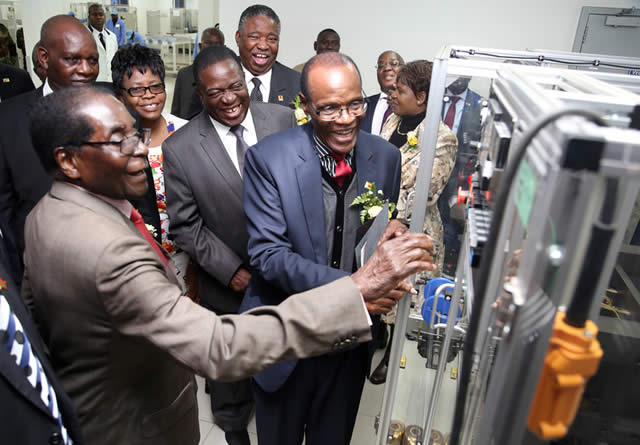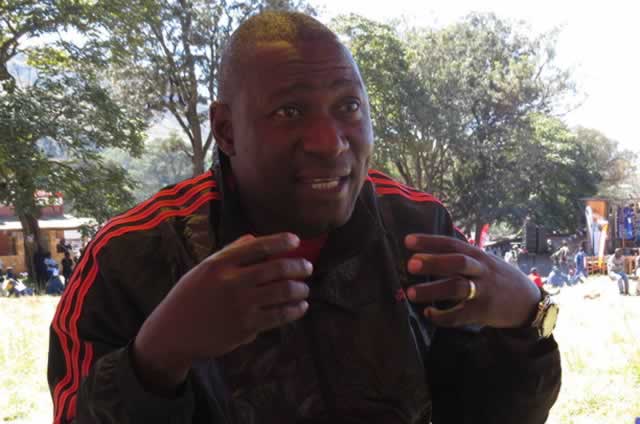President commissions passport centre


President Mugabe is shown how to operate the hot stamping machine by Registrar-General Tobaiwa Mudede at the official opening of the National Passport Production Centre in Harare yesterday. Looking on are Vice Presidents Emmerson Mnangagwa and Phelekezela Mphoko and Harare Provincial Affairs Minister Miriam Chikukwa. — Picture by Chief Photographer Believe Nyakudjara
Fidelis Munyoro Chief Reporter
President Mugabe yesterday commissioned a state-of-the-art passport production centre at KGVI which prints 16 000 booklets daily. This development will eliminate the long queues that characterised the Registrar-General’s Office due to increased demand for travel documents. Commissioning the centre, President Mugabe said Zimbabwe remained committed to the adherence of robust standards of travel documents and international security.
“We are happy, as a country, to be among the pioneers of e-passport production,” said President Mugabe, extending his gratitude to the companies and countries that assisted in establishing the modern passport production centre.
He urged the Home Affairs ministry to explore ways of further reducing the cost of obtaining passports and other travel documents and the decentralisation of the process. “We also should ensure that our people can easily obtain these documents, not too far away from their homes throughout the country,” he said.
President Mugabe said the e-passport would boost the country’s security by enhancing border controls, in addition to expediting the processing of travellers at immigration points.
He said it would also thwart the production of fake travel documents.
“The achievement we are witnessing today could only have come about, as a result of passionate commitment to excellence and strict management of resources,” he said.
“I would like to encourage others in Government to emulate the continuous innovation and improved business process re-engineering in the improvement of service delivery displayed here.”
The introduction of e-passports, said President Mugabe, also marked an important step forward in the implementation of the Home Affairs Command and Control System (HACCSY) that is spearheaded by the Zimbabwe Republic Police and extended to the immigration department under the same ministry.
The President said a similar approach should be used to bring to fruition the other key components, such as automated fingerprint identification system (AFIS) and the computerised border management system envisioned under HACCSY.
The passport production system of the centre was established with technologies provided by Japanese companies — Marubeni Corporation, Marpless, Uno Seisakusho and Toppan Insatsu Printing in partnership with GET. These Japanese companies’ involvement in the project was made possible by the introduction from NIP Global, an Israeli IT company.
Speaking at the same occasion, Japanese Ambassador to Zimbabwe Mr Yoshi Tendai Hiraishi, expressed confidence that the centre would greatly contribute to the improvement of Zimbabwe’s essential social infrastructure by reinforcing the country’s capacity to produce passports both in quantity and quality.
“I am very pleased and excited to note that this has been realised by utilising Japanese technologies,” he said. “In addition, let me ask everybody to pay attention to the high quality service of Japanese companies, which have an internationally established reputation.”
Looking at the occasion in the context of bilateral relations between the two countries, Mr Hiraishi said the commissioning of the centre could be regarded as an important milestone to mark the start of nourishing bilateral relations between the two countries following President Mugabe’s recent visit to Japan.
President Mugabe was in Japan last week where he and Japanese Prime Minister Shinzo Abe signed a Joint Statement in which both leaders agreed to further strengthen the two countries’ bilateral relationships in the field of economic, technical and other co-operation.








Comments